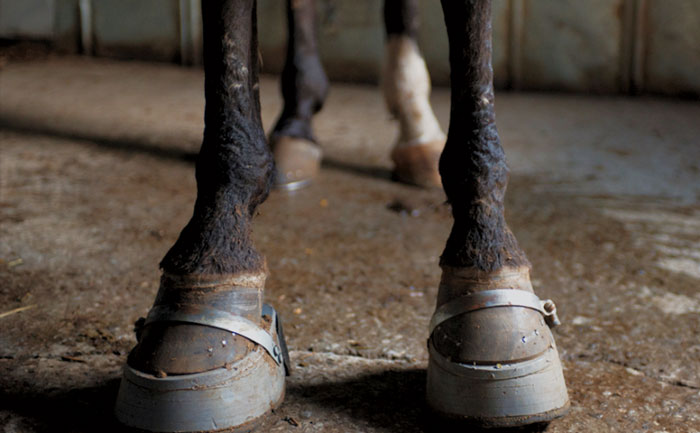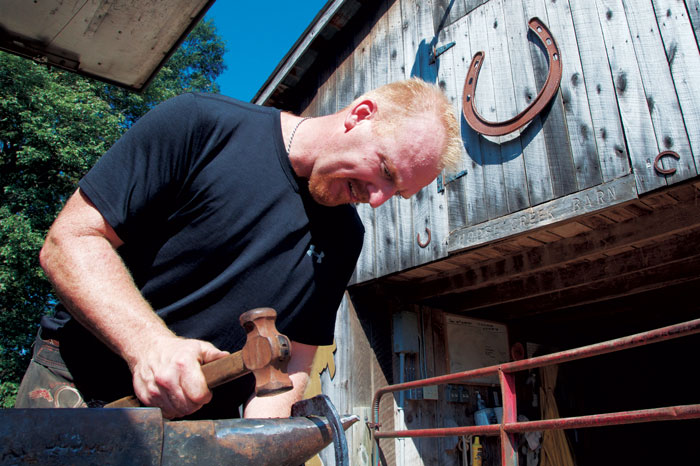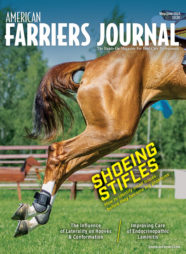U.S. Department of Agriculture Proposes Anti-Soring Rule
The United States Department of Agriculture’s Animal and Plant Health Inspection Service (APHIS) is accepting public comments on its proposal for new Horse Protection Act requirements that aim to eliminate horse soring.
Soring is the intentional application of substances or devices to horses’ limbs to inflict pain to achieve an exaggerated high-stepping gait, known as The Big Lick, in show rings.
The proposed changes to farriery prohibit “any device, method, practice, or substance applied to any horse that could hide or mask evidence of soring, as well as all action devices and non-therapeutic pads and wedges, and substances applied about the hoof.”
The proposal defines an action device as “any boot, collar, chain, roller, beads, bangles, or other devices, which encircles or is placed upon the lower extremity of the leg, or slide up and down the leg so as to cause friction, or which can strike the hoof, coronet band or fetlock joint.”

The Animal and Plant Health Inspection Service is accepting public comments on a proposed rule to amend the Horse Protection Act. Photo by: Humane Society of the United States
Artificial toe length extensions are prohibited unless they are prescribed to the horse and it is receiving therapeutic treatment.
“Toe extensions can be used to sore horses by increasing stress on certain tendons and ligaments,” states the rule.
In addition, the proposed rule also prohibits:
- Grinding or trimming the sole of the hoof to expose spongy, sensitive tissues underneath the sole.
- The removal or trimming of normal support structures of the hoof wall. Removing the support causes the sole to bear all of the weight. This is called “rolling the sole.”
The proposed rule can be viewed in the Federal Register at federalregister.gov/documents/2023/08/21/2023-17814/horse-protection. Comments about the rule may be submitted at regulations.gov. APHIS will consider all comments received through Oct. 20, 2023.
What a New Workplace Heat Standard Might Mean for Farriers
Farriers around the United States often find themselves working in extreme heat and cold. Many have suffered from heat-related illnesses, injuries and even fatalities. The U.S. Department of Labor conducted various discussions over the past summer to establish a new workplace heat standard for small businesses.
Agricultural small businesses and farriers likely will be affected in some ways, as they are often exposed to temperatures exceeding 80 degrees Fahrenheit. Because of this, the Department of Labor invited various small business owners, local government entities and other agencies to partake in the workplace heat standard discussion.

Daniel Bishop, CF, of Arlington, Tenn., forges a bar shoe outside of a local barn. The Department of Labor and the Occupational Safety and Health Administration are exploring a new workplace heat standard for small businesses. Photo by: Jeff Cota
As temperatures rise, there are more exposures to workplace hazards. Heat- related illnesses can happen in and outdoorws at the workplace; however, most of these illnesses are rarely reported or recognized. These high temperatures can cause illnesses and become a problem for many farriers who work outdoors or within a barn.
Although the workplace for a farrier typically exceeds the 80 degrees Fahrenheit heat limit, many small businesses, and farriers were exempt from most of these rules. If a small business has 10 workers or less, they do not have to keep safety records unless requested by the Occupational Safety and Health Administration (OSHA) or the Bureau of Labor Statistics. If the small business owner is self-employed, and only hires intermediate family members, or domestic workers, then they are exempt from OSHA rules and regulations entirely. In this case, small business owners are only required to report any incidents or injuries they have at the workplace.
OSHA, the Small Business Administration, and the White House Office of Information and Regulatory Affairs will establish a panel consisting of small business representatives to suggest recommendations for a standard.







Post a comment
Report Abusive Comment